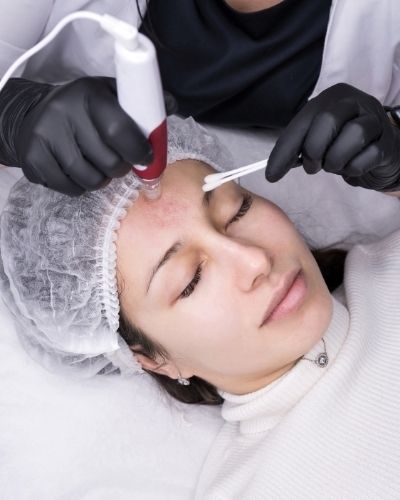Traditionally linked to religious rituals, detoxification, and spiritual cleansing, fasting is now being explored for its potential effects on various aspects of physical health, including skincare.
Among the myriad of questions raised by skincare enthusiasts, one stands out: Can fasting help with acne and acne scars?
And while the science on fasting and acne is lacking, and more needs to be researched for a definitive answer, there are a few explanations as to why fasting could potentially help reduce acne and improve acne scars for some people.
Therefore, this article will delve into the science behind fasting and its possible relationship with skin health, mainly focusing on acne and acne scars, offering insights for those navigating the complex world of this common inflammatory condition.

Understanding Acne & Acne Scars
Acne is more than just a skin condition; it’s a complex interaction between hormones, skin oil, and bacterial growth.
It usually appears during puberty but can persist or even start in adulthood and can continue to appear occasionally or more intensely well into one’s 40s and 50s.
The primary culprits behind acne are:
Excess Oil: The sebaceous glands produce too much oil that, instead of moving towards the skin’s surface, remains stuck inside the pore where it hardens.
Dead Skin Cells: These cells stick to the hardened oil and accumulate inside the pores, causing a clog.
Bacteria: The hardened plug attracts a strain of bacteria that feed on it and proliferate in the airless environment.
Inflammation: Bacterial overgrowth triggers the immune system into “fight mode, ” resulting in swelling and redness associated with a pimple.
Additionally, acne is divided into several types based on its severity.
Whiteheads: Closed, clogged pores.
Blackheads: Open, clogged pores with a black tip.
Papules: Small, red, tender bumps.
Pustules: Red, tender bumps with pus at the tip.
Nodules: Large, solid, painful lumps beneath the skin’s surface.
Cysts: Painful, pus-filled lumps beneath the skin’s surface.
The Complexity of Acne Scarring

When acne clears, it can leave behind scars.
The appearance or nature of these scars depends on the severity of the acne and the skin’s response to the inflammation.
Pigmentary Scars:
Post-inflammatory hyperpigmentation (dark spots) and post-inflammatory erythema (red spots) aren’t technically scars but discolorations left on the skin after an acne lesion has healed.
Atrophic Scars:
These are indentations in the skin, often a result of severe acne that has led to loss of skin tissue.
Hypertrophic Scars:
These raised and often brown or reddish scars occur when the skin produces too much collagen in an attempt to heal after inflammatory lesions have healed, causing the skin to become more elevated in some areas.
What is Fasting?
Fasting, the voluntary abstinence from food and drink, is a practice that dates back centuries and spans various cultures and religions.
Today, it’s gaining traction not just for spiritual or religious reasons but also for its potential health benefits.
Here are the common types of fasting:
Intermittent Fasting:
This is one of the most popular forms of fasting, which involves alternating cycles of eating and fasting, and you’ve probably seen it on social media.
Popular methods include the 16/8 method (fasting for 16 hours and eating during an 8-hour window,) the 5:2 method (eating normally for five days a week and restricting calories on the other two days,) and “eat-stop-eat,” a method that involves fasting for 24 hours once or twice a week.
Water Fasting:
This is another popular form of fasting that involves consuming only water for a certain period, typically 24 hours to several days.
It’s seen as a way to detox and reset the body, promote weight loss and autophagy, and improve metabolic health.
The General Health Benefits of Fasting

When we fast, our bodies undergo several notable biological changes that can lead to various health benefits:
Hormonal Adjustments
One of the most significant changes during fasting is the adjustment in hormone levels, particularly a drop in insulin, which can be particularly beneficial for individuals with type 2 diabetes.
Additionally, a drop in insulin will result in lowered inflammation in the body, as well as a decline in the hormone cortisol, also known as the stress hormone, which may lead to an improved state of well-being.
Finally, fasting has been found to increase levels of human growth hormone, which is essential for health and fitness as it aids in muscle growth and fat loss and potentially slows aging.
Cellular Repair Processes
Fasting initiates autophagy, a process where cells clean out damaged and dysfunctional components.
This cellular maintenance is vital for preventing diseases, including infections and cancer, as noted in some papers that linked this process to increased longevity and overall health improvement.
Mental Clarity and Concentration
This could be due to the body’s switch to using ketones, produced from fat breakdown in the absence of glucose, as an alternative brain energy source.
Some studies suggest that ketones may offer cognitive benefits, including improved brain function and neuroprotection, which could enhance mental clarity and concentration during fasting.
Does Fasting Help Acne and Acne Scars?
Fasting can help reduce inflammation by lowering insulin levels, which may decrease the frequency and severity of acne breakouts.
Additionally, the enhanced autophagy process during fasting can also contribute to an improved complexion.
This is essentially the body’s way of cleaning out damaged cells to regenerate newer, healthier cells, which will kick-start your body’s natural spring cleaning, potentially leading to clearer and healthier skin.
However, while these benefits are promising, it’s important to remember that they are still largely theoretical.
The research on fasting and its impact on skin health is still in its early stages, and while some studies suggest potential benefits, more robust and extensive studies are needed to establish these effects firmly.
Additionally, it’s important to note that many professionals have conflicting opinions on fasting and acne, with some saying that fasting can lead to dehydration caused by insufficient water intake, which can contribute to increased oil production as the skin attempts to compensate for the lack of moisture, which could lead to more acne.
On the other hand, some studies suggest that during a period of caloric restriction, sebum levels are reduced, which can influence the degree of acne severity and contribute to improving this inflammatory condition.
Also, another essential detail to remember is that everyone’s body responds differently to fasting, so what works for one person might not work for another.
Furthermore, while fasting might help manage acne for some, some professionals argue that it might not be as effective for acne scars.
Some sources suggest that fasting might boost scar healing, but others argue that water, which is often consumed during a fast, doesn’t break down scar tissue or fade pigments.
Therefore, while fasting could potentially help with acne and acne scars, it’s important to approach it with realistic expectations and always monitor sharp changes in your diet with the help of a health professional or a nutritionist who is particularly experienced with the specific nuances of fasting.
Considerations and Precautions
While the potential benefits of fasting for acne and acne scars are promising, it’s crucial to approach this practice with a balanced perspective.
Here are some important considerations and precautions:
Individual Variability:
Fasting isn’t a one-size-fits-all solution. People respond differently to fasting based on their health, metabolism, and lifestyle. What works for one person might not work for another.
Balanced Diet for Skin Health:
Nutrients from a balanced diet are essential for maintaining healthy skin and controlling inflammatory conditions such as acne. Therefore, fasting should not lead to nutrient deficiencies, which can negatively impact skin health.
Medical Supervision:
Before starting any fasting regimen, especially for individuals with pre-existing health conditions, it’s important to consult with a healthcare provider. This is crucial to ensure that fasting is done safely and is tailored to individual health needs.
Mental and Emotional Health:
Fasting can be physically, mentally, and emotionally challenging. It’s essential to be mindful of these aspects and seek support if needed.
Listening to Your Body:
It is essential to pay attention to how your body reacts to fasting. If fasting causes adverse effects, particularly on skin health, the fasting regimen may need to be reconsidered or adjusted.
Additional Methods to Manage Acne and Acne Scars

Here are some effective methods to manage acne acne acne scars:
Topical Treatments
Topical treatments are often the first line of defense against acne.
Products containing ingredients like salicylic acid, benzoyl peroxide, and retinoids can unclog pores, reduce inflammation, and accelerate skin cell turnover.
These treatments are available over the counter and can be effective for mild to moderate acne.
Consistent use as per the product instructions is vital to seeing results.
Prescription Medications
For persistent or severe acne, dermatologists may recommend prescription medications.
These can include oral antibiotics to reduce bacteria and inflammation, oral contraceptives to regulate hormones in women, or stronger topical retinoids such as Accutane for more pronounced effects.
Professional Treatments
Professional treatments like chemical peels, laser therapy, and microneedling can be highly effective for acne scars.
Chemical peels involve applying a solution to peel off the top layer of skin, helping to reduce the appearance of scars.
Laser therapy uses focused light to resurface the skin, break down scar tissue, and encourage the skin to regenerate itself.
Microneedling involves puncturing the skin with tiny needles to stimulate collagen production, which will fill out the lost tissue and improve scar appearance.
Lifestyle Changes
Lifestyle factors play a crucial role in skin health.
Regular physical activity can improve circulation and reduce stress, which can positively impact acne.
Adequate sleep and stress management are also important, as they can affect hormone levels linked to acne.
A balanced diet, especially one low in sugar and dairy, can help reduce acne flare-ups by, similarly to fasting, lowering insulin levels and inflammation in the body and promoting a state of homeostasis.
Skincare Routine
A consistent skincare routine tailored to your specific skin type is crucial.
This includes gentle cleansing, using non-comedogenic products, moisturizing regularly, and protecting your skin from harmful UV rays with the use of sunscreens with a high SPF of at least 30 and over daily.
It’s also important to avoid picking or squeezing pimples, as this can worsen acne and tear the skin, leading to scarring.
Regular visits to a dermatologist or an esthetician can also help refine your routine and address specific skin concerns as they come along.

My name is Simone and I am a certified skin specialist. I created this website to teach my readers how to take great care of their skin and I also like to occasionally share my honest opinions on skincare products I’ve tried. You can learn more about me here.
